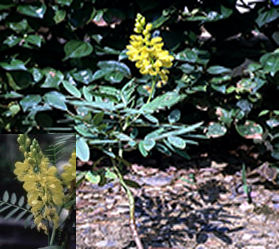| Botanical Name |
Cassia
angustifolia |

|
| Common
Name |
English:Tinnavelli
senna |
| Family |
Caesalpiniaceae
(Leguminosae) |
| Parts Used |
Leaves
and Pods |
| Medicinal Property |
A
sweet cooling laxative herb with a tea like aroma and antibacterial
effects. Internally for constipation; The action of glucosides is
particularly on the peristaltic movements by its effect on the intestine
wall. Usually prescribed with carminatives to reduce griping. Excess and
frequent usage may cause nausea, vomiting, abdominal pain, and
inflammation of the gastrointestinal tract. |
| Chemistry |
It
contains 0.33 % B-sitosterol. Active constituents are the derivatives of
anthraquinone. Leaves and pods contains senosides A, B, C, D, rhein and
aloe-amine in free and compound forms. Leafs and leaflets contain
kampferol, anthraquinone, essential oil, calcium salts, isohamnentin,
rhein and emodin. |
| Description |
Small
perennial under-shrub with pale sub erects or obtusely angled erect or
ascending branches. The leaves are large compound and pinnate. Leaves are
usually 5-8 jugate, oval-lanceolate, glabrous, bluish green to pale green
in colour. Racemes are axillaries erect many flowered and flowers are
bright yellow. Seeds are obavate, cuneate and compressed. |
| Distribution |
Cultivated
in south- western arid tracts of Tamil Nadu and
some parts of Gujarat. |
| Economics |
It
is the main ingredient of most laxative preparations and also Used as a
herbal tea. |
| Warning |
Not
given to pregnant women or patients with colitis or spastic constipation. |
|